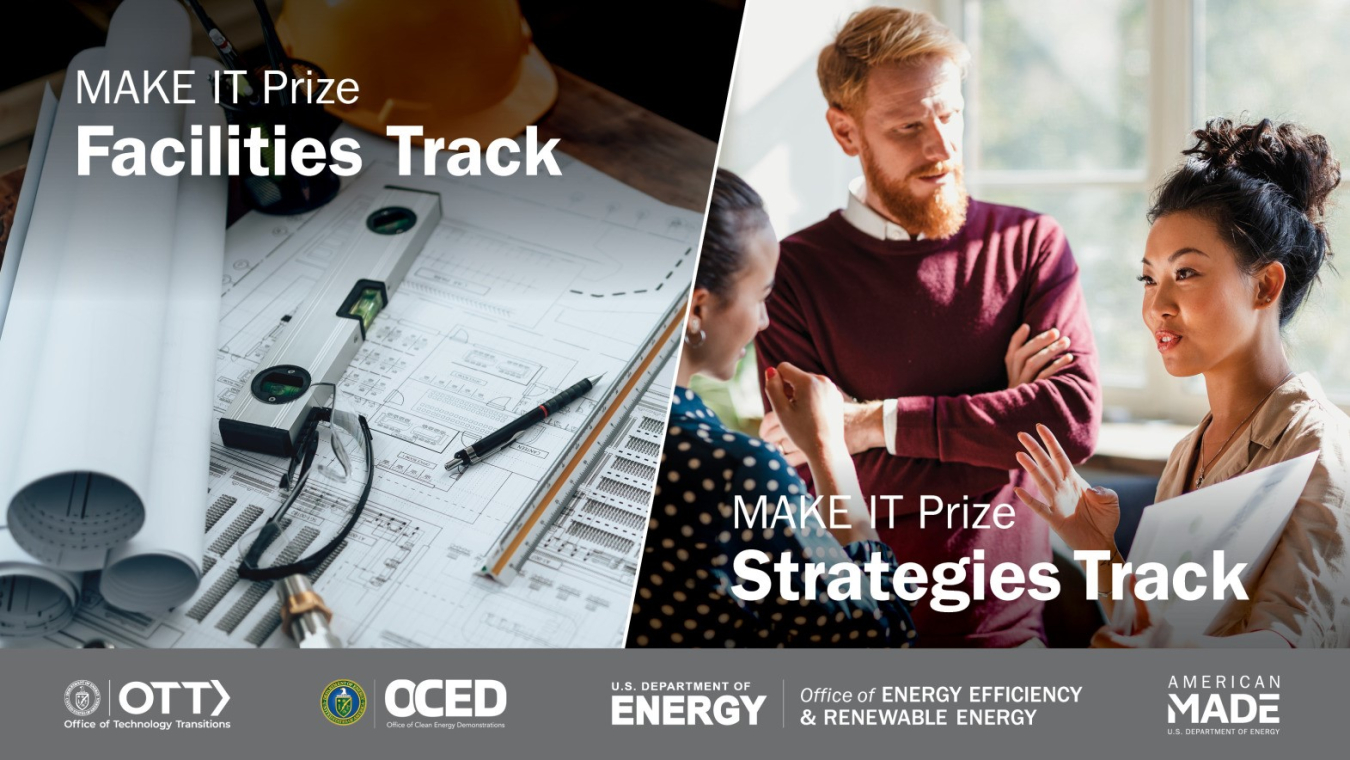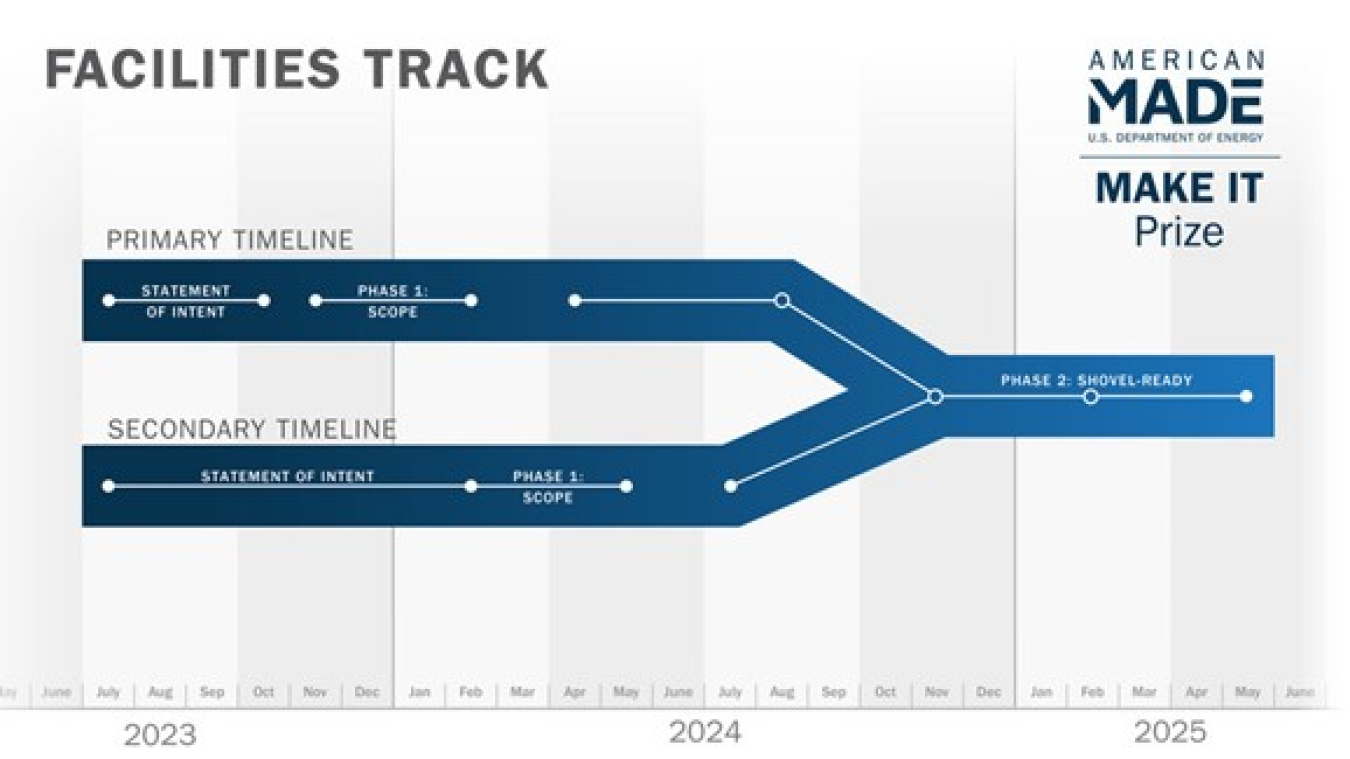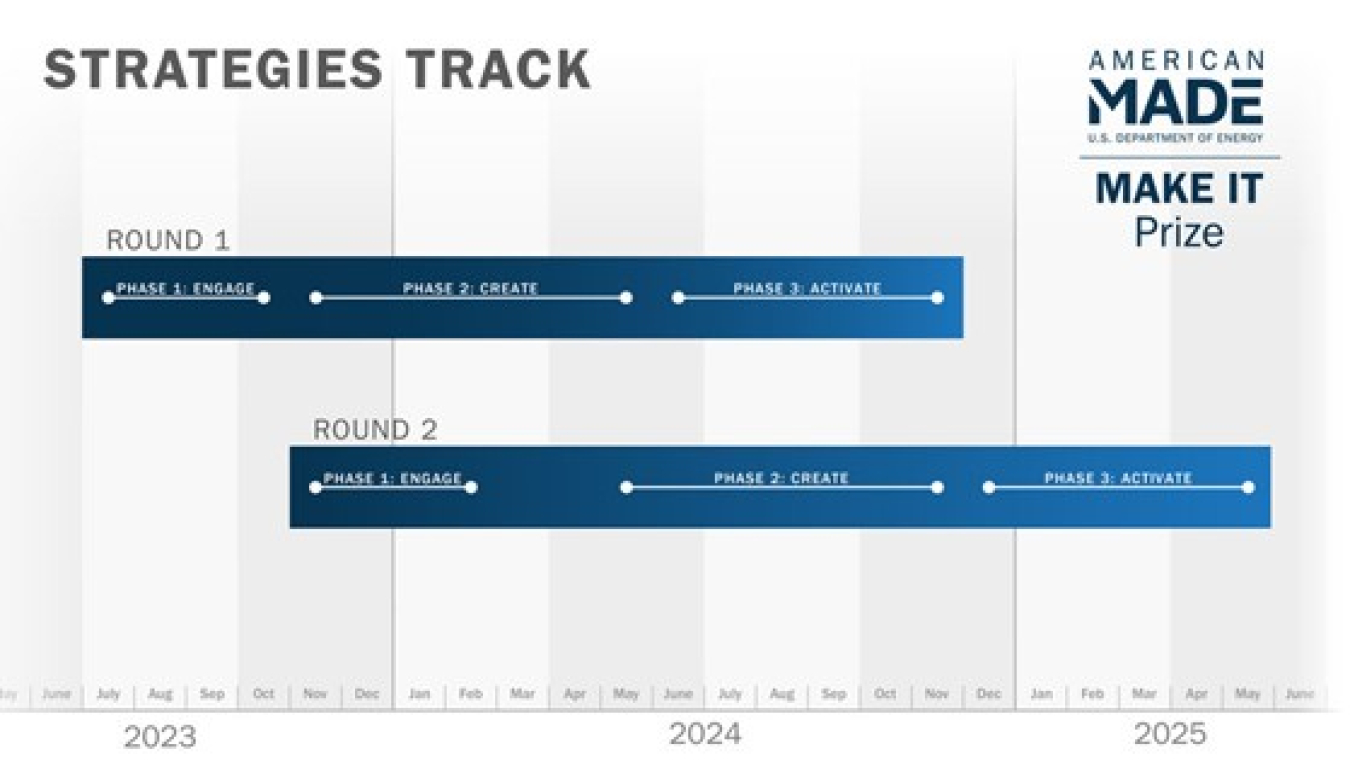Today, the U.S. Department of Energy (DOE) announced winners in both the Facilities and Strategies Tracks of the Manufacture of Advanced Key Energy Infrastructure Technologies (MAKE IT) Prize. DOE awarded a total of $4,500,000 to nine Facilities Track Phase 1 winners and a total of $600,000 to 12 Phase 1 Strategies Track winners.
Office of Technology Transitions
April 10, 2024
Today, the U.S. Department of Energy (DOE) announced winners in both the Facilities and Strategies Tracks of the Manufacture of Advanced Key Energy Infrastructure Technologies (MAKE IT) Prize. DOE awarded a total of $4,500,000 to nine Facilities Track Phase 1 winners and a total of $600,000 to 12 Phase 1 Strategies Track winners.
The MAKE IT Prize was developed by the Office of Technology Transitions (OTT), the Offices of Clean Energy Demonstrations (OCED), and Energy Efficiency and Renewable Energy (EERE) with the goal of catalyzing the domestic manufacturing of critical clean energy technology components. The prize is accelerating the development of clean energy manufacturing facilities through two tracks with different but aligned goals: the Facilities and the Strategies Track. Facilities Track winners have demonstrated credible plans for establishing manufacturing facilities, with the intent of being ready to break ground by the end of the competition. Strategies Track winners have shown that they have the expertise, experience, and connections to work with stakeholders in their communities to develop roadmaps for attracting clean energy manufacturing and secure commitments from manufacturers to come to their regions.
“The MAKE IT Prize is helping catalyze domestic clean energy manufacturing and the development of secure, diverse, and domestic supply chains,” said DOE Chief Commercialization Officer and Director of the Office of Technology Transitions Dr. Vanessa Z. Chan. “Thanks to President Biden's Investing in America agenda, we are bringing back domestic manufacturing, and MAKE IT is helping communities take advantage of this momentum.”
Both tracks of the MAKE IT Prize include multiple phases of competition. The prize will leave a lasting impact for winners and manufacturers in their communities.
Among the winners:
- Anderson Clean Energy, on behalf of Bosch US, plans to establish an electrolyzer manufacturing facility in South Carolina. The electrolyzers manufactured in that facility will be a critical component for some of the OCED-funded Regional Clean Hydrogen Hubs and for future clean hydrogen generation facilities.
- Switched Source plans to establish a manufacturing facility for hybrid inverters, a bottleneck for electric grid upgrades.
- CellCube plans to establish a manufacturing facility for vanadium redox flow batteries, one of the most promising long-duration energy storage solutions.
- The Rosebud Sioux Tribe will engage with community stakeholders and develop an integrated approach to workforce development, clean energy development, and manufacturing to benefit Native Americans on their Reservation and their partners attracting clean energy manufacturing activity.
Facilities Track Primary Timeline Phase 1 Winners
The Facilities Track is geared towards entities looking to build domestic manufacturing facilities for specific critical clean energy components, such as those necessary for clean hydrogen infrastructure, upgrades to the electric grid, and long-duration energy storage.
Through two separate timelines, Primary and Secondary, eligible teams compete in Phase 1: Scope with the hope of advancing to Phase 2: Shovel Ready.

The nine winners below are the first group to move on to the Phase 2: Shovel Ready stage of the competition. The Secondary Timeline of Facilities Phase 1 remains open until May.
Congratulations to the first group of Facilities Track Phase 1 Winners:
- Ballard's fuel Cell Engine Manufacturing Facility – Ballard Power Systems intends to establish a new hydrogen fuel cell engine assembly facility in Rockwall, Texas. The new facility is estimated to create over 100 new highly skilled jobs.
- CellCube Lean Energy Assembly Network (CCLEAN) – CellCube seeks to accelerate vanadium redox flow battery manufacturing in the U.S.
- Ceramic NaSICON Membranes for LDES – Led by Adena Power, this project will partner with Current Chemicals to revitalize an existing brownfield facility to rapidly scale manufacturing of sodium super ionic conductor ceramic electrolyte membranes - a critical component for several long-duration sodium battery technologies.
- Components for Fuel Cell Trucks: 100% Made in US – Led by Boston Materials, this project aims to solve key issues for hydrogen fuel cell trucks by manufacturing proton-exchange membrane fuel cell components—bipolar plates—that are lighter and lower cost than the incumbent technology, with a potential life of 30,000 hours.
- Conformable Hydrogen Tanks for Production Capacity – Led by Noble Gas Systems, this project seeks to convert a currently vacant building in Southeast Michigan into a manufacturing facility for conformable hydrogen fuel tanks. The project envisions the creation of 50 high-quality jobs in a disadvantaged community.
- H2 Electrolyzers for North American Market – This Bosch US-led project will initiate domestic manufacturing of 1.25MW PEM electrolyzer stacks for the North American market.
- Hybrid Transformer–Power Electronics Equipment Manufacturing – This project by Switched Source will ramp up manufacturing of hybrid transformers for distribution utilities, leveraging power electronics for distribution automation through medium voltage power flow control. The project expects to create more than 75 new jobs in disadvantaged communities, while also collaborating partners to develop upskilling initiatives and enhance workforce development.
- Linde Hydrogen Storage Vessel – Linde Engineering will draw on its experience in fabrication at its German facilities to begin the domestic fabrication of vacuum-insulated storage vessels for gaseous and liquid hydrogen. The project aims to help secure the U.S. supply chain for liquid hydrogen.
- Securing America’s Vanadium Electrolyte Supply – Led by Stryten Energy, this project by will redevelop a shuttered facility in Augusta, Georgia to build a large-scale manufacturing facility for vanadium electrolyte production. This project hopes to rapidly scale the US-based production and commercialization of vanadium redox flow battery components and systems.
In Phase 2, these teams will demonstrate that they are “shovel-ready” for the construction of a manufacturing facility, including proof of location access, permits, financing, and community engagement. As part of their work to compete for Phase 2, they will finalize the location where they intend to establish their manufacturing facility. Winners will be awarded $4.5 million each in the final phase of this track.
Strategies Track Round 2 Phase 1 Winners
The Strategies Track is designed for teams working to promote clean energy manufacturing activity in their geographic regions through a three-phase competition: Phase 1: Engage; Phase 2: Create; and Phase 3: Activate.

In November 2023, Round 1 Phase 1 of the Strategies Track concluded with 13 winning teams, who each received $50,000 for demonstrating that they have the expertise and capacity to attract, expand, and support equitable clean energy manufacturing in their regions. DOE is now selecting 12 additional winners after completion of the first phase of Round 2.
Congratulations to the Round 2 Phase 1 Winners:
- Building A Climate Resilient Future for All (Delaware)– Led by the Delaware Sustainable Clean Energy Coalition, this project will bring together Delaware community partners, universities and community colleges, industry professionals and entrepreneurs, and environmental justice organizations to gather input and build a comprehensive roadmap to enable Delaware to become a hub for clean energy innovation, production and workforce development.
- Clean Energy Manufacturing in Mendenhall, MS (Mississippi)– This Son Solar Mississippi-led project will develop a roadmap to establish clean energy manufacturing, economic development, and job creation in the rural community of Mendenhall, MS, including identifying development partners and potential manufacturing facility locations.
- Creating the Equitable Clean Energy Future (Georgia) – Advancing & Catalyzing Clean Energy Leadership, led by the Georgia Institute of Technology, will develop a clean energy technology roadmap for Georgia, that aims to position Georgia as a global leader in clean energy technology within the next 10 years.
- Inland SoCal for Advanced Manufacturing (California) – Led by Blended Impact and including partnerships with the California Governor's Office of Business and Economic Development, the Center for Sustainable Energy, California's Manufacturing Network, and the Inland Economic Growth and Opportunity Collaboration, this initiative aims to spur clean energy manufacturing and economic growth in Riverside and San Bernardino counties in California.
- Innovate Jonesboro (Maine) – This Born Global-led project will develop novel bioproduct manufacturing capacity throughout Maine, tailored to disadvantaged communities, by introducing novel bioenergy products, creating new manufacturing jobs and increasing parity in Maine’s clean energy transition.
- Joliet Commercialization Coalition (JCC) (Montana)– Led by the Joliet Commercialization Coalition, this project will expedite the assessment and cleanup of brownfield sites across Montana, while advancing clean energy manufacturing and environmental justice.
- Make It Mohawk Valley (New York) – This project seeks to establish the Mohawk Valley as an innovation hub and place where clean energy manufacturers can thrive through collaboration and outreach, leveraging existing industry adjacent companies in metal fabrication, electrical wiring, and specialty tool manufacturers.
- MAKE IT on the Rosebud Reservation (South Dakota) – Led by the Rosebud Sioux Tribe, this project will work to attract clean energy and related manufacturing partners in a way that benefits both partners and members.
- Metal Fuels Alliance (Virginia)– Led by Dominion Energy Innovation Center, this project brings together partners, utilities, and community labor and tribal organizations to advance green alumina manufacturing and drive industrial decarbonization across Virginia’s I-64 Corridor.
- Project 81 (Oklahoma)– Project 81 aims to establish advanced manufacturing incubators along US Highway 81 in Oklahoma, with the goal to modernize and expand the existing manufacturing base by providing access to advanced manufacturing technologies often too expensive for small manufacturers. The project will also create workforce development programs in coordination with the Oklahoma Career Technical System.
- Quincy’s Strategy to “Make It” Happen! (Florida) – This project, led by Big Bend Community Development Corporation, seeks to attract clean tech manufacturers and fuel cell developers to create employment opportunities and economic growth in the rural community of Quincy, FL.
- South Arkansas Green Energy Project (SAGEP) (Arkansas) – The South Arkansas Green Energy Project seeks to attract clean energy manufacturing to the City of Strong and Union County, Arkansas to boost economic growth. Partners include The City of Strong, Southwest Arkansas Planning and Development District, University of Arkansas Pine Bluff, and the Black Community Development Chamber of Arkansas.
These winners will now join the Round 1 winners and compete to create a roadmap for clean energy manufacturing in their region and demonstrate interest from manufacturers. Approximately 20 winners will be awarded $100,000 each across the two rounds of Phase 2 and advance to Phase 3.
Ultimately, approximately eight grand prize winners will be selected and awarded $250,000 each for developing a clean energy manufacturing roadmap and attracting plans for a manufacturing facility to their region.
What’s Next for the MAKE IT Prize
Competing teams for both MAKE IT Prize tracks will submit relevant materials in May. At the end of the prize competition, DOE will have awarded a total of approximately $30 million in federal funding to teams from both tracks.
To learn more about the MAKE IT Prize and be notified about future winner announcements, follow the Facilities Track and Strategies Track on HeroX, the official prize platform.
The MAKE IT Prize was developed by the DOE’s OTT, OCED, and EERE and is funded by the Technology Commercialization Fund through the Bipartisan Infrastructure Law. The prize is administered through the American-Made program, a fast track to clean energy innovation that accelerates the transition from ideas into real-world clean energy solutions.

